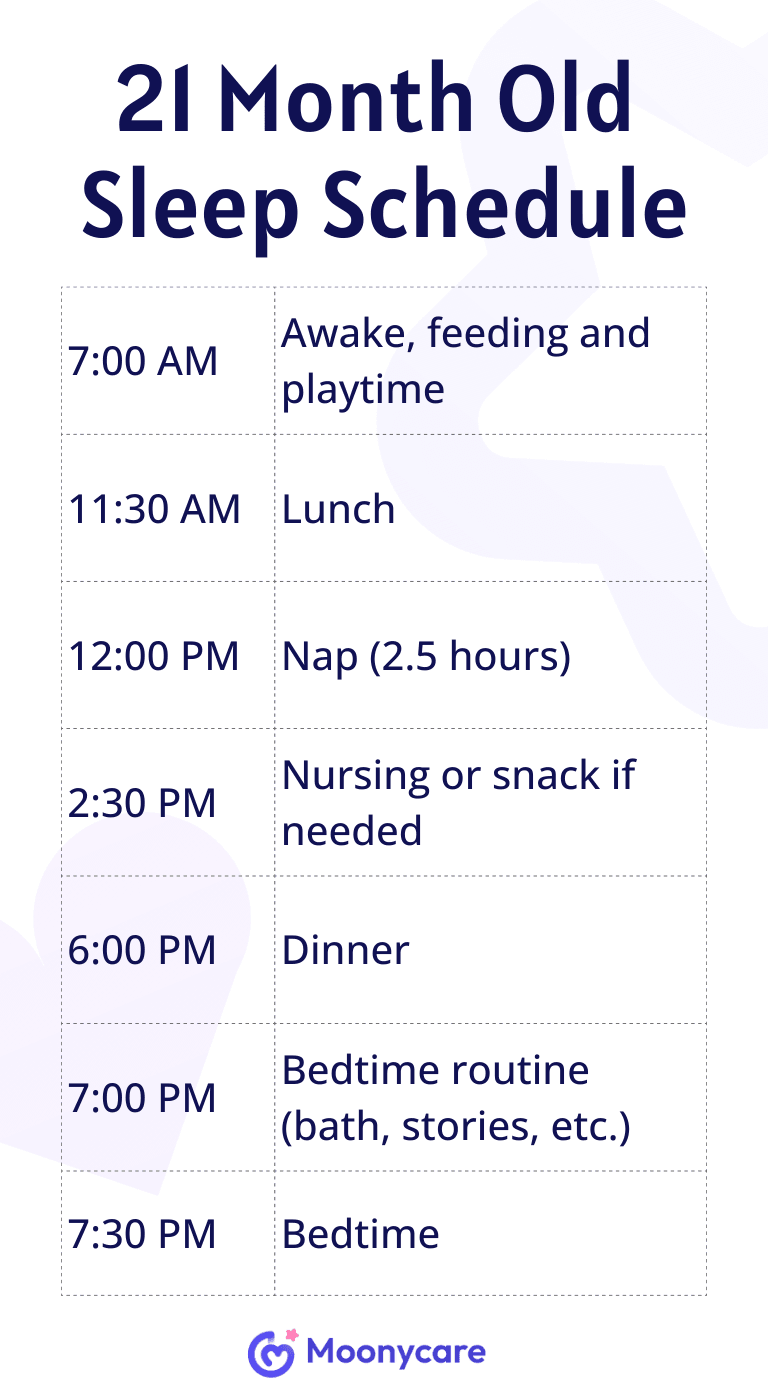

As your toddler reaches 21 months, you might be noticing a growing vocabulary and an increasing ability to communicate in short phrases. With your baby continually evolving, ensuring your little one gets enough rest is crucial. A well-balanced sleep schedule can help get recharge and prevent overtiredness. In this guide, we'll explore the sleep needs of 21-month-olds. If you're adjusting to a new sleep pattern or looking to refine your current routine, we'll provide practical advice to support your child's healthy sleep habits.
If you want a personalized sleep schedule for your 22-month baby, it is recommended to use Moonycare app, which can understand baby's sleep needs and customize a special sleep schedule to your baby, helping your baby and family get the rest they need.
IN THIS ARTICLE:
What are Wake Windows for a 21-Month-Old?
A Sample Sleep Schedule for 21-Month-Old Babies
Is There a 21-Month Sleep Regression?
How to Deal with Separation Anxiety at 21 Months?
What if My 21 Month Old Baby Won’t Sleep?
What are 21-Month-Old Milestones?
What are Wake Windows for a 21-Month-Old?
Wake windows are the periods your toddler can comfortably stay awake between sleep times. It tends to lengthen as toddlers grow, requiring a more structured sleep schedule to accommodate their developing bodies and minds. At this age, these wake windows typically last around 4 to 6 hours.
For example, after waking up in the morning, your child might stay awake for about 5-6 hours before needing a nap. Following the nap, the next wake window before bedtime might reduce to 4-5 hours, depending on your toddler's activity levels and mood. Understanding and adjusting these wake windows can help minimize overtiredness and promote smoother transitions to sleep.
Sample 21 Month Old Sleep Schedule
A typical sleep schedule for a 21-month-old might look like this:

Depending on your toddler's unique sleep needs, you may need to adjust this schedule slightly.
Bedtime for a 21-month-old
How Much Should a 21 Month Old Sleep?
At 21 months, most toddlers require about 12 to 14 hours of sleep in a 24-hour period. This typically includes 10 to 12 hours of nighttime sleep. Some toddlers may need more or less sleep depending on their activity levels, growth spurts, and individual temperament.
Getting enough sleep is crucial for baby's development, because adequate rest supports cognitive growth, emotional regulation, and physical health. If your child consistently wakes up tired or is irritable during the day, it may be a sign that they need more sleep or that their schedule needs adjustment.
What Time Should a 21 Month Old Go to Bed?
At 21 months, the ideal bedtime should be around between 7:00 and 8:00 PM. This timing aligns with their natural circadian rhythms and ensures they get enough nighttime sleep. Meantime, it is important for parents to make their baby sleep at the same time each day, which delivers a message to baby that they need to sleep.
To promote better sleep, you can also build a gentle routine with a couple of calm activities before falling asleep, such as a warm bath, brushing teeth, reading a story, and gentle rocking or cuddling. These calming activities help your toddler transition from playtime to sleep time, making it easier for them to fall asleep and stay asleep through the night.
Why Does My 21 Month Old Keep Waking Up at Night?
Night waking in a 21-month-old can be caused by a variety of factors, including teething, growth spurts, separation anxiety, or even nightmares. If your toddler is waking up frequently at night, try to identify any potential triggers. It may help to provide extra comfort or reassurance, but be mindful not to establish habits that could lead to further sleep disruptions.
Ensuring your toddler's sleep environment is conducive to rest, such as dark, quiet, and cool, can also reduce night waking. If night wakings persist, consider adjusting their bedtime routine or consulting a pediatrician for additional guidance.
Naptime for a 21-month-old
How Long Should a 21 Month Old Nap?
A 21-month-old typically needs one nap per day, lasting between 2 to 3 hours. This nap usually occurs in the early afternoon, providing a much-needed break during a busy day. This midday nap helps your toddler recharge, making it easier for them to stay active and engaged until bedtime.
If your toddler struggles to nap for this duration, consider adjusting their wake windows or creating a more calming pre-nap routine. Besides, make the nap occur at the same time each day to establish a routine that your child's body can anticipate.
How Many Naps are Expected for a 21 Month Old?
By 21 months, most toddlers have transitioned to a single nap per day. It is common to see this transition at this age. Normally, one nap is sufficient to meet their sleep needs as long as it is complemented by a solid night's sleep.
Some toddlers may resist this change initially, but maintaining a consistent schedule can help them adjust. If your child seems excessively tired or cranky after dropping the second nap, you may need to slightly adjust the timing of the remaining nap or bedtime to ensure they get enough overall rest.
Is There a 21 Month Sleep Regression?
Sleep regressions can occur at any age and can be triggered by diverse reasons. It is also possible for 21-month-old babies to experience the regression in sleep, who may fall asleep difficultly, wake up frequently at night, wake up earlier than usual, take fewer or irregular naps, become more emotional, show more resistance behaviors, etc. At this age, babies may encounter this phenomenon because:
- The peak of separation anxiety
- Rapid developmental milestones
- Changes in environment
- The great excitement or curiosity of the newly mastered skills
- Discomfort caused by teething
Besides, a large number of new parents may wonder how long does 21 month sleep regression last?
Generally speaking, sleep regression is temporary and usually lasts from a few weeks to a month. Each baby's situation is different, so it is not a fixed answer. For some babies, sleep regression may last for a shorter period of time (such as 2-3 weeks), while for some babies who are affected by multiple factors or are more emotionally sensitive, it may last 4-6 weeks or even longer. In addition, the duration of sleep regression is also related to the specific cause of the regression. For example, if it is due to separation anxiety or the mastery of new skills, sleep problems will usually gradually improve as the baby gradually adapts to these changes. If it is due to environmental changes or health problems (such as tooth eruption), you will need to wait until these factors are resolved before the baby's sleep will return to normal.
How to Deal with Separation Anxiety at 21 Months?
During this stage, babies are in a period of rapid development. They begin to realize that they are independent individuals from their caregivers, but at the same time they rely on the caregiver's presence for a sense of security. Separation anxiety is a common emotional reaction in children as they grow up, especially when they are separated from their parents or primary caregivers. Parents should accept their children's emotions, avoid overreacting or blaming their children, and make them feel understood and supported. In addition, you can also do as the following:
Establish a stable daily routine: A regular life helps children feel safe. Try to keep a fixed schedule, such as eating, sleeping and playing times, which can let children predict what will happen next, thereby reducing the anxiety caused by uncertainty.
Tell them in advance: Tell your child in advance when you need to leave, and explain where you will go, what you will do, and when you will be back. Even if children don't fully understand it yet, this announcement will help them gradually adapt to the concept of separation.
Make a short but firm goodbye: Don't sneak away, as this may increase your child's anxiety. Give a short and clear goodbye and leave decisively. Long goodbyes or repeated appearances may make the situation worse.
Create a comfortable environment: Find someone familiar to your baby to take care of your baby. Also, making sure your child is left in a familiar and comfortable environment with a favorite toy or blanket can help them feel more secure in your absence.
Gradually extend the separation: If possible, try starting with short periods of separation, such as a few minutes, and then gradually increase the time. This can help your child slowly get used to being without you.
What if My 21 Month Old Baby Won’t Sleep?
Here are some general tips for your 21-month-old who won't sleep, but remember that every child is unique and may need different approaches to help them establish good sleep habits.
1. Keep a consistent schedule: Try to get your baby to bed and wake up at the same time every day, even on weekends. This helps adjust your baby's body clock and makes it easier to fall asleep.
2. Create a comfortable sleep environment: Make sure your baby's bedroom is quiet, dark, and at a comfortable temperature. Use tools like blackout curtains and white noise machines to help create a sleep-friendly environment.
3. Establish a bedtime routine: Set a relaxing bedtime routine for your baby, such as a bath, reading a story, gently rocking, or singing. These activities can help your baby relax and signal to them that it's time to get ready for bed.
4. Get plenty of activity during the day: Make sure your baby gets enough activity time during the day to burn off excess energy and fall asleep more easily at night.
5. Limit stimulating activities: Avoid overly exciting or stimulating activities near bedtime, such as watching TV, playing video games, or strenuous exercise.
6. Pay attention to diet: Avoid giving your baby too much food or caffeinated drinks close to bedtime (although caffeine is not usually part of an infant's diet). Make sure your baby eats the right amount for dinner and has enough time to digest.
7. Check the diaper: Check your baby's diaper to see if it is wet or dirty before bedtime, and change it to a clean, comfortable diaper in time, so that your baby will feel more comfortable and fall asleep.
8. Solve physiological problems: Parents should solve physiological problems that may affect their baby's sleep in time before going to bed, such as flatulence, colic, gastroesophageal reflux, diaper rash, etc. Take corresponding measures according to the symptoms to help your baby relieve discomfort.
9. Give a sense of security: Sometimes babies may not want to sleep because of separation anxiety. You can try to give your baby a comfort item, such as a plush toy or a blanket, to increase their sense of security.
10. Solve night wakings: First observe the reason for your baby's night wakings, whether it is a physiological need or an emotional need. Take appropriate measures according to the needs, such as feeding, changing diapers, or giving comfort. For night wakings that are not urgent needs, try to delay comfort and gradually extend the response time so that your baby can learn to self-soothe and reduce the number of night wakings.
What are 21 Month Old Milestones?
1. Physical Development
Walking and running: Most 21-month-olds are able to walk independently and are beginning to learn to run. Their steps are more stable and they are more coordinated when they run. Some babies may even try to trot or chase objects.
Climbing and jumping: Your baby may become more adept at climbing up furniture (such as sofas, chairs) or stairs, and may even start to try to jump down from low places. They also begin to show more adventurous spirit and explore their surroundings.
Fine motor skills: Your baby's fine motor skills in his hands are further developed, and he can pinch smaller objects (such as building blocks, beads) with his fingers, and try to use simple tools (such as spoons, paintbrushes). They may start to try to feed themselves, although they are not very proficient yet.
Imitative actions: Your baby likes to imitate the actions of adults, such as sweeping the floor, cleaning the table, and talking on the phone. This imitative behavior helps them learn new skills and enhance their self-awareness.
2. Cognitive Development
Understanding simple instructions: Your baby can understand and follow simple two-step instructions, such as "Bring the book here" or "Go get your shoes." They also begin to understand some basic concepts, such as "up", "down", "inside", "outside", "big", "small", etc.
Object permanence: Babies have a strong concept of object permanence, that is, they know that an object still exists even if they can't see it. They will actively look for hidden toys and can remember the location of objects.
Classification and matching: Babies begin to be able to classify objects according to shape, color or size. They may put similar items together or try to match shapes into corresponding sockets.
Enhanced memory: Babies' memory gradually improves and they are able to remember some events or activities in daily life. They may remember what happened the day before and express it when appropriate.
3. Language development
Increased vocabulary: Babies at 21 months old can usually say about 50-200 words, but each child's language development speed is different. Some babies may say more, while others may say less. At the same time, babies begin to combine two or more words together to form simple phrases to express their needs and wishes.
Understanding more words: Although babies have a limited vocabulary, they understand more words and phrases. They can respond to questions by nodding, shaking their heads, or pointing, and can understand some simple questions (such as "What do you want?").
Imitation of pronunciation: Babies like to imitate the pronunciation and intonation of adults and may repeat words or phrases they hear. They also supplement their expressions with gestures and expressions.
4. Social and emotional development
Interacting with others: Babies begin to interact more actively with other children and adults. They may play with other children, although this is usually parallel play (i.e., each playing with their own toys but close to each other). They also begin to show more cooperation and are willing to share or take turns playing with toys with others.
Emotional expression: Babies' emotional expression becomes more diverse, and they may express happiness, anger, sadness, or anxiety through laughing, crying, screaming, hugging, etc. Separation anxiety is still common at this stage, and babies may show discomfort with their parents leaving.
Increased self-awareness: Babies begin to realize that they are independent individuals and may show more autonomy. They may refuse help and insist on doing certain things by themselves, such as getting dressed, brushing their teeth, or eating.
5. Self-care skills
Dressing and undressing: Babies begin to try to undress themselves, especially simple items like socks, hats, or coats. They may need help putting on their clothes, but they will gradually learn how to cooperate. You can teach them simple skills such as zipping and buttoning.
Washing hands and brushing teeth: Babies can begin to learn the basic steps of washing hands and brushing teeth, although they still need adult supervision and help. You can teach them how to rinse their hands with water or how to hold a toothbrush. Gradually develop their ability to complete these tasks independently.
Toilet training: Some 21-month-olds show signs of being ready to go to the toilet.
More Related Questions
1. Should I let my 21-Month-Old Baby Sleep in Bed?
According to the American Academy of Pediatrics, babies aged 21 months should sleep in the same room with their parents but not in their beds. This is because sleeping in the same bed with parents increases the risk of sudden infant death syndrome (SIDS) and other sleep-related deaths. Therefore, for the safety of your baby's sleep, it is recommended that your baby sleep in a bed designed specifically for them, such as a crib or cradle, rather than sharing an adult bed with their parents. This can reduce the risk of suffocation caused by the baby's mouth and nose being covered by pillows, quilts and other items on the bed, and it also helps to cultivate the baby's habit of sleeping independently. Therefore, for babies aged 21 months, they should sleep in their own bed, not their parents' bed.
But if you choose to let your child sleep in the bed with you, be sure to use bed rails to prevent the baby from accidentally falling off the bed. Remove dangerous items and make sure there are no excessive pillows, stuffed toys or other items on the bed that may cause suffocation.
2. How to "Reset" Sleep After a Disruption?
If your toddler's sleep routine has been disrupted, perhaps due to illness, travel, or a major life change, you can "reset" their sleep by gradually reintroducing their usual schedule. Start by setting a consistent bedtime and wake-up time, and reestablish your pre-sleep routines.
If your child is struggling to adjust, consider using gentle sleep training techniques, like gradually reducing your presence in the room as they fall asleep. You should be patient because it needs time to restore a disrupted sleep schedule. Plus with consistency, your toddler should return to their regular sleep pattern.























